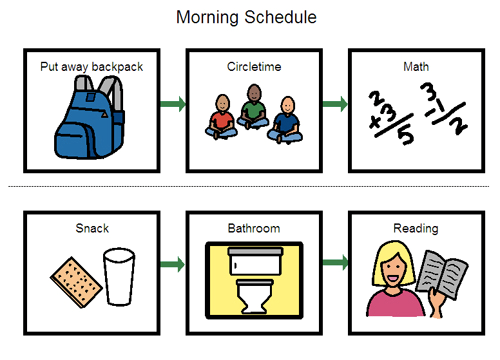Highly-Specialist Speech and Language Therapist and Senior Lecturer, Dr. Rachel Mallia-Borg, gives us a taste of her Doctoral Research relating to Visual Support Systems and parents’ perspectives of using such therapy tools:
“As a Speech and Language Therapist, I was always interested in trying to understand whether the therapy tools I suggested where actually beneficial to parents. I would often have conversations with colleagues and say things such as: What are parents thinking when I suggest ‘visuals’? Research and experience had taught me that using visual support systems (vss), as a therapy tool was effective (e.g. Johnston et al. 2003). Conversely, I had this urge to understand whether parents of children with Autism did indeed find these useful. When you work as a health professional, you are constantly looking at ways of improving the way you deliver services. I wanted to therefore establish what was working well and what modifications were required in terms of the way vss were being presented to parents.
These therapy tools are typically used with children with Autism, to alleviate behaviour and improve communication skills (Gray 1993). They can be any tool presented visually and generally tend to include, but are not limited to, the use of a drawing/photograph depicting an object or the steps involved in a task (see Figure 1):

Figure 1. Visual schedule depicting morning events at school (Applied Behavioural Strategies 2016).
My thesis concerned the examination of parental perspectives regarding the support they received in relation to vss within a health service. Adopting a qualitative, case study methodological strategy, a total of ten participants participated in either a focus group or semi-structured interview. Results revealed that for the most part parents were content with the support received from the health professionals. Most professionals recommended the use of the therapy tools, as this was not always common knowledge:
when you are going about your daily life … yeah there’s visuals everywhere … signs for speed … and everything else … but … you just accept them … you know … you don’t think that you’re going to use that … to dress your child
Parents’ reactions to the introduction of vss differed. Some were pleased with this decision from the start; others were more open to the idea once a clearer understanding of the therapy tools was obtained:
when I did hear about it first … I was actually really … not … not totally in favour of it … I was very kind of … I remember coming home and I was kind of like oh my god … is this … what you think my child is going to do … like … is my child just going to use pictures to communicate …
Whilst most parents felt that the professionals demonstrated appropriate interpersonal skills, the lack of collaboration between health and education services was emphasised by some. Additionally, although the quality of information provided to parents was satisfactory, some parents commented on the lack of support offered. Lastly, and as important, parents provided rich data in relation to the strengths and barriers of using these tools.
Most parents reported that making vss can be a “time consuming” process requiring organisation, “an awful amount of thinking” and “planning”, and “lots of pictures”. Nonetheless, vss use the child’s strengths to work on their needs, with most parents describing their children as being very “visual”. Verbal messages can be too quick for children to process, and therefore visual messages allow children time to process the message. As one parent stated: “it’s amazing how taking the words out of it sometimes just makes it far more simple for people”.
Implications for practice suggest: the need for regular discussions with parents in relation to VSSs; further examination of service delivery; the need for professionals to draw on parent-professional partnership literature; the implementation of strategies to encourage parental engagement and prevent possible barriers.
Please contact me – Dr. Rachel Mallia Borg, rachel.mallia-borg@canterbury.ac.uk, if you have any comments or questions.
 Faculty of Arts, Humanities and Education
Faculty of Arts, Humanities and Education Samantha Osborne
Samantha Osborne 704
704


